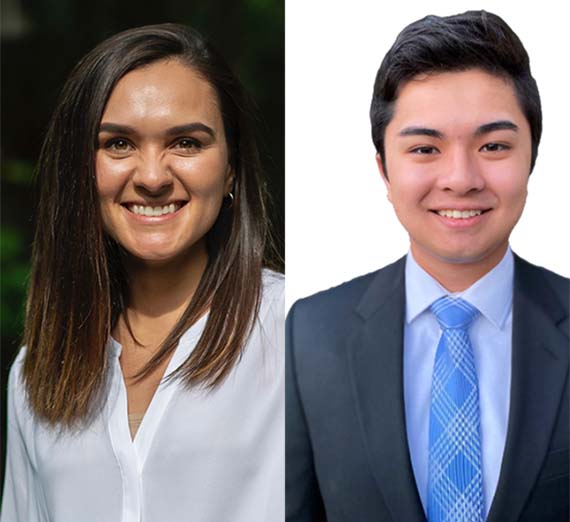Encouraging and Supporting Diversity in Medicine

When Melissa Rangel-Abeyta arrived at UW School of Medicine-Spokane in 2015, she was already breaking new ground.
“I didn’t even learn about medical school until I was 17. I was the first person in my family to earn a college degree,” she said. “I’m mixed-race, and I strongly identify with my Latina heritage.”
Determined to encourage diversity in medical school applicants and to support those who were underrepresented on campus, in 2016, she launched Underrepresented in Medicine (URiM). URiM refers to an individual hailing from a racial, ethnic, or other disadvantaged population that is disproportionately represented within the medical community.
“There weren’t these groups to connect with in Spokane, so I talked with Dr. Janelle Clauser (assistant dean for Foundations at the UW School of Medicine – Gonzaga University Health Partnership) about starting one, and she was so supportive,” Rangel-Abeyta said. “At first it was just Dr. Clauser and I hosting events, but the response from fellow students was great.”
The mission of URiM is to recruit and retain medical students from underrepresented backgrounds and foster an inclusive community for students and faculty. The Spokane service- learning group continues to grow and now includes Students for Equality, Diversity and Inclusion (SEDI) as well as UWSOM’s Alliance for Equal Representation in Medicine (AFERM) groups.
One of URiM’s first events was hosting a panel featuring diverse UWSOM-Spokane students. High school and community college students were invited to attend.
“In talking with fellow medical students, I heard several say, ‘I’ve never seen a doctor who looks like me,’” Rangel-Abeyta recalled. “Our initial panel included BIPOC and Bosnian students.”
That first session became an annual fall event and grew to include a suture clinic, MCAT (Medical College Admission Test) prep workshops, as well as Q&A panels.
Dr. Rangel-Abeyta is currently completing her surgical residency in Chicago and was delighted to learn that the program she founded is thriving under continued student leadership.
Samartha Shrestha serves as the current director. URiM impacted him when he was an undergrad at Whitworth University.
“I attended the fall event in 2018,” he recalled. “The MCAT seminar gave me insight into time management on test day and offered a variety of ideas for test prep resources. I also took a seminar on writing your personal statement for your medical school application. I’m not a writer, so it was incredibly helpful.”
Even more than the practical tools, Shrestha learned from panel members that medicine is a lifelong journey. Framing his education in that way allowed him to take a gap year, before entering medical school at UWSOM-Spokane. During that year, he was able to help in COVID vaccination clinics and even take a trip to Guatemala, working in a clinic there and sharpening his Spanish skills.
“I’m thankful for URiM—it helped me adjust my timeline and understand that the journey is always there,” he said.
Getting involved with the group was a priority for him in this, his first year, at UWSOM-Spokane.
“Marginalized groups have endured trauma that leads to mistrust of the medical community,” Shrestha said. “URiM is an important step in reaching out to bridge that trust gap—it’s about understanding the barriers others face.”
Shrestha took over the leadership from Colby Weil-Lonigan, who worked hard in the midst of COVID-19 to expand the group’s offerings.
“We’ve kind of exploded in the last few years,” she said.
Weil-Lonigan had attended two URiM fall sessions as an undergrad.
“Hearing those personal stories from UW School of Medicine students was a fantastic experience.”
Some of those stories reflected her own.
“I’m mixed race,” she said. “My mom is an Indonesian immigrant and my Indonesian family didn’t have health insurance. I saw the dichotomy and what white privilege brings you.”
Her personal experience fueled her desire to affect change.
“Medicine needs to match the people it serves,” said Weil-Lonigan. “We need to demonstrate that not everyone is a cookie-cutter medical student.”
Under her leadership, URiM created a website, reached out to the Latinx group at Eastern Washington University, and launched ‘Coffee Talks,’ a series of casual gatherings with current medical students at the Schoenberg Center on the Gonzaga campus.
“I’m headstrong. I like to change things,” she said. “URiM is now the biggest service-learning group on the Spokane campus.”
Weil-Lonigan was connected with a medical student mentor through AFERM (Alliance for Equal Representation in Medicine) which traditionally provides mentors through the Seattle campus.
“In 2021 we began matching UWSOM-Spokane students with Spokane medical residents for mentorship,” she said.
AFERM also provides mock interviews and coaching for underrepresented or disadvantaged applicants invited to interview at UWSOM.
Josefine Bribiesca-Rodriguez is one of UWSOM-Spokane’s mock interview leads.
“My father immigrated from Mexico and I’m the first family member to go to college. When you’re younger, you really want to have a doctor who looks like you,” she said. “I did the AFERM mock interview. I loved it—it was so helpful. It built confidence. I wanted to be part of the program.”
The Spokane AFERM team has already done their first round of mock interviews with another round scheduled in the New Year.
“It was amazing,” Bribiesca-Rodriguez said of leading the first round. “We met someone who did the interview and was already accepted to the UW School of Medicine.”
Bribiesca-Rodriguez also serves as the SEDI (Students for Equality, Diversity and Inclusion) lead.
“While URiM reaches out into the community to recruit students, SEDI is more directed toward UWSOM-Spokane students,” she explained. “We host SEDI walks with faculty and students, and coffee talks. It’s a way to offer support and connection.”
Dr. Rangel-Abeyta said she’s humbled and gratified by the growth of the program she started.
“There’s a continuing need for greater diversity and representation in medicine,” she said. “There’s still a lot of work to do. Sometimes it’s exhausting championing for your community, but our goal is to take some of the weight from the shoulders of future students.”
